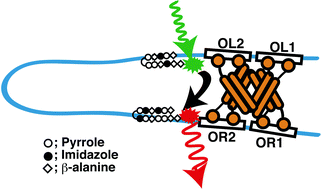The application of fluorescence-conjugated pyrrole/imidazole polyamides in the characterization of protein–DNA complex formation
Abstract
N-Methylpyrrole (Py)–N-methylimidazole-(Im) polyamides are sequence-specific DNA-binding modules that are widely used for gene regulation, as synthetic transcriptional factors and as sequence-specific DNA alkylating agents. Recently, Py–Im polyamides have been conjugated with fluorophores, resulting in conjugates that are useful for the detection of specific DNA sequences. A Förster resonance energy transfer has been observed between Cy3- and Cy5-conjugated Py–Im polyamides on the nucleosome, indicating that fluorescence-conjugated Py–Im polyamides could possibly be used to characterise protein–DNA complexes. In this minireview, we discuss recent reports regarding fluorescence-conjugated Py–Im polyamides and their future application in the characterization of protein–DNA complex formation.


 Please wait while we load your content...
Please wait while we load your content...